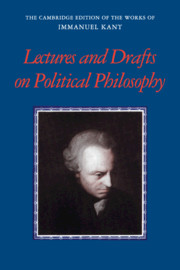Book contents
- Frontmatter
- Contents
- General Editors’ Preface
- Acknowledgments
- General Introduction
- Translators’ Remarks
- Reflections on the Philosophy of Right
- Natural Right Course Lecture Notes by Feyerabend
- Drafts for Published Works
- Drafts for Theory and Practice
- Drafts for Towards Perpetual Peace
- Drafts for the Metaphysics of Morals
- Drafts for Conflict of the Faculties
- Glossary
- Topical and Chronological Concordance
- Editorial Notes
- Index
Editor’s Introduction
Published online by Cambridge University Press: 10 December 2020
- Frontmatter
- Contents
- General Editors’ Preface
- Acknowledgments
- General Introduction
- Translators’ Remarks
- Reflections on the Philosophy of Right
- Natural Right Course Lecture Notes by Feyerabend
- Drafts for Published Works
- Drafts for Theory and Practice
- Drafts for Towards Perpetual Peace
- Drafts for the Metaphysics of Morals
- Drafts for Conflict of the Faculties
- Glossary
- Topical and Chronological Concordance
- Editorial Notes
- Index
Summary
Kant forced himself to write for a certain amount of time every day. At least from the time he was able to afford to have a servant, he woke at 5:00 a.m., drank some tea, pondered things while smoking a bowl of tobacco, and worked on his lecture preparation and on his other ideas, then after his two hours of morning lectures returned to work until the midday meal, then after a break for a walk and to spend more time with his friends he returned to work or to read. To be certain of getting this work time he reportedly had his servant Lampe, who had earlier served in the military, enter his room just before 5:00 a.m. and shout with full military seriousness, “It is time!”; Kant was so proud of this routine that he sometimes boasted to guests that Lampe never had to try to awaken him twice. The notes Kant worked on for his lectures in these early morning hours were inscribed into his textbooks. Other notes would appear on loose sheets. Kant clearly worked out his ideas in writing, given the large number of fragments offering similar but distinct arguments and approaches to a single topic. One can trace the subtle changes in his thoughts as he works from lecture preparation through general reflection to draft material to the final published work.
The transitions one can find in the various modes of Kant's handwritten notes show that there is no firm line between a Reflection for a course and some preparatory work or a draft for particular published works. But such a distinction was presupposed in Erich Adickes's original plan for the third part of the Academy edition, since he planned two volumes of Vorarbeiten und Nachträge to be separated from the remainder of Kant's handwritten notes. (German distinguishes between Vorarbeiten, or preparatory work in general, and Entwurf, or a draft closer to the finished product; the material in Volume 23 is identified as Vorarbeiten but includes Entwurfe, and in keeping with English terminology, are all considered as drafts here.) The general introduction to this volume discusses Adickes's plans in more detail.
- Type
- Chapter
- Information
- Kant: Lectures and Drafts on Political Philosophy , pp. 183 - 186Publisher: Cambridge University PressPrint publication year: 2016

